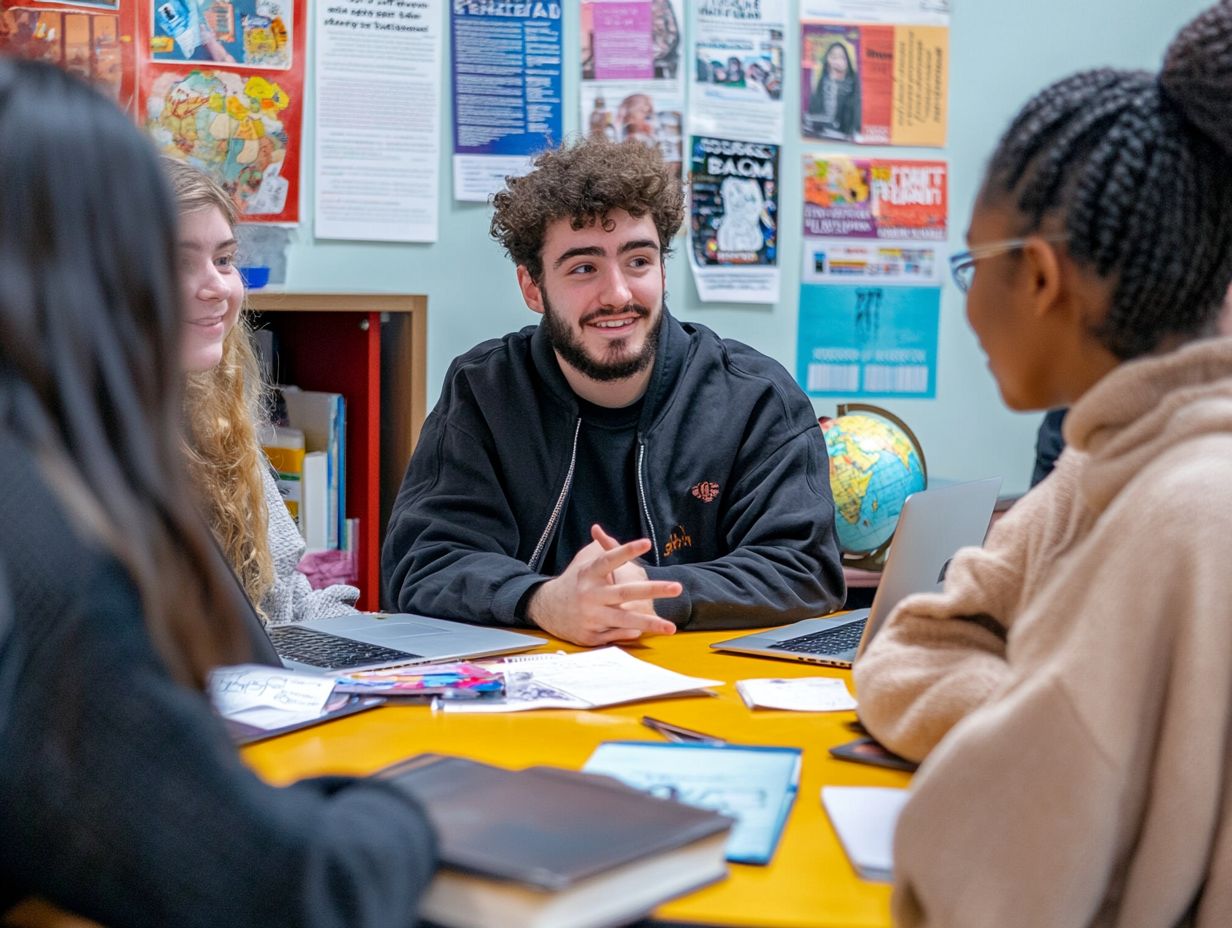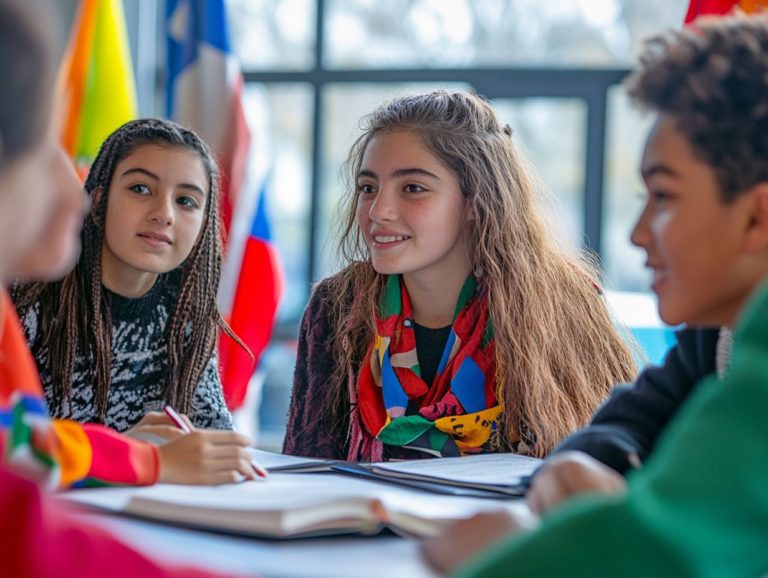Cultural Adjustment Resources for Students
Cultural adjustment is a journey you embark on when moving to a new country. It’s a significant chapter in your international student experience. This article delves into the intricacies of cultural adjustment, breaking down its stages and the common challenges you might encounter in unfamiliar environments.
This article also highlights valuable resources and support services designed to ease your transition. With practical tips and insights on the advantages of cultural adjustment, this guide aims to empower you to thrive in your new surroundings while fostering personal growth and expanding your worldview.
Contents
- Key Takeaways:
- Understanding Cultural Adjustment
- Challenges Faced by International Students
- Resources for Cultural Adjustment
- Tips for a Smooth Cultural Adjustment
- Practical Advice and Strategies
- Benefits of Cultural Adjustment
- Frequently Asked Questions
- What resources can help students adjust to a new culture?
- Why are cultural adjustment resources important for students?
- What types of cultural adjustment resources are available for students?
- How can cultural adjustment resources benefit international students?
- Are there any online cultural adjustment resources for students?
- How can students access cultural adjustment resources?
Key Takeaways:

- Seek support from on-campus resources and join cultural organizations to help in your cultural adjustment process.
- Overcome common challenges with practical advice and strategies to promote personal growth and a global perspective.
- Understand the stages of cultural adjustment and be aware of its challenges to navigate your experience effectively.
Understanding Cultural Adjustment
Cultural adjustment is the intricate process you undergo as you adapt to a new cultural landscape, especially if you’re a refugee in the U.S. You’ll find this transformative journey shapes your personal and social identity in incredible ways! It also fosters emotional well-being and lessens the impact of culture shock.
Successfully navigating this complex experience demands a keen awareness of the rich tapestry of cultural diversity in America, which includes social norms, values, and communication styles.
What is Cultural Adjustment?
Cultural adjustment is the journey you embark on to navigate and adapt to a new cultural environment. If you’re grappling with culture shock, it’s crucial to understand the importance of personal identity.
For refugees, this journey can be particularly daunting due to the unfamiliarities of a new society and the emotional scars left by displacement. Initially, you might find yourself in a whirlwind of shock and confusion, struggling to reconcile your former identity with new expectations. As you move through this experience, you’ll likely encounter various psychological phases, from denial to acceptance, each significantly shaping your self-perception.
Community support becomes essential during this transformative journey. It provides essential resources and fosters connections that help ease your transition. Ultimately, this support allows you to reclaim your identity while embracing new cultural elements, weaving a richer tapestry of who you are.
The Stages of Cultural Adjustment
The stages of cultural adjustment unfold in a fascinating journey that begins with a honeymoon phase filled with excitement. This is followed by the inevitable challenges of culture shock, adjustment phases, and eventual adaptation. Each of these stages profoundly impacts your emotional well-being.
During the honeymoon phase, you may find yourself enchanted by your new surroundings, captivated by the customs, cuisine, and landscapes that differ from what you know. However, that initial bliss can quickly shift to culture shock, where the thrill turns into frustration as you navigate miscommunication and contrasting social norms, leaving you feeling disoriented.
This discomfort can significantly affect your sense of personal and social identity, potentially leading to feelings of isolation or confusion. As you navigate the adjustment phase, you might find yourself adopting new behaviors and values. Ultimately, you will arrive at a stage of adaptation, where your understanding of both your original culture and the new one can harmoniously coexist.
Establishing healthy coping mechanisms like seeking support from fellow expatriates or diving into community activities becomes essential during this transformative journey.
Challenges Faced by International Students
International students frequently encounter a myriad of challenges as they navigate the complexities of cultural adjustment. You may experience culture shock, grapple with social identity issues, and face the intricacies of building a support system while adapting to a new environment.
Culture shock is the feeling of disorientation you may experience when encountering an unfamiliar culture. Social identity issues can arise as you try to blend your previous identity with new cultural elements.
As you navigate these challenges, remember that you are not alone. Seek out support, engage with your community, and take steps to embrace this enriching journey!
Common Difficulties and How to Overcome Them

You will face challenges during your cultural adjustment as an international student, such as feelings of loneliness stemming from culture shock and navigating various phases of adjustment.
Additionally, you may find it difficult to access community resources for support. These obstacles can lead to homesickness, cultural misunderstandings, and substantial academic pressure, which can significantly impact your overall experience.
To counter these issues, it s advisable to seek out local community resources, such as cultural centers or student organizations, which can help foster a sense of belonging.
Incorporating mindfulness techniques like meditation and breathing exercises can also be beneficial. These practices allow you to cultivate a sense of calm amidst the chaos of transition.
Joining clubs or groups that align with your interests can facilitate social connections. This enables you to build a network of friends who share similar experiences and challenges.
Resources for Cultural Adjustment
You have access to a wealth of resources to facilitate your cultural adjustment journey. Agencies that help newcomers settle, university support services, and specialized training for trainers in culturally sensitive practices can provide invaluable assistance along the way.
Support Services and Programs
Support services and programs, such as University Health Services and MSU Counseling, are vital in helping you navigate the complexities of cultural adjustment.
These organizations provide a wealth of resources designed to foster a sense of belonging and community during this overwhelming transition.
For example, workshops on understanding local culture equip you with crucial knowledge about local customs and practices. They also offer peer support groups, allowing you to share your experiences and emotions with others who understand.
Programs like language exchange initiatives enhance your communication skills while building meaningful connections with locals. This effectively alleviates feelings of isolation.
Ultimately, these services play a significant role in enriching your social identity and emotional well-being, enabling you to flourish in your new environment.
Cultural Organizations and Events
Cultural organizations and events offer you invaluable opportunities for engagement. They create a sense of belonging while championing diversity in America as part of your cultural adjustment journey.
For many international students and refugees, immersing yourself in local cultural festivals, workshops, and art exhibitions can be truly transformative.
Don t miss out! Events organized by entities like the International Rescue Committee or nearby cultural centers not only provide a platform for you to share your unique traditions but also foster interaction with diverse communities.
Through these enriching experiences, you can forge friendships, enhance your language skills, and cultivate a deeper understanding of American social dynamics. This active involvement adds depth to your personal narrative, guiding you as you navigate your identity within a multicultural landscape.
Ultimately, these connections nurture resilience and imbue you with a sense of purpose, supporting your overall integration.
Tips for a Smooth Cultural Adjustment
To facilitate a seamless cultural adjustment, embrace practical advice and strategies that emphasize effective verbal and non-verbal communication.
Focus on fostering connections with others and actively seek support from community resources. This approach will not only enhance your experience but also enrich your interactions within a new cultural landscape.
If you need help or wish to join a local group, don’t hesitate to reach out!
Practical Advice and Strategies

Practical advice for cultural adjustment includes seeking community resources, establishing routines, and employing healthy coping strategies to manage the stresses associated with adapting to a new culture.
An effective approach for newcomers is to tap into local support networks, such as cultural centers or organizations designed for refugees and international students. These organizations are treasure troves of resources! They provide valuable offerings, including language classes, workshops, and social events that help you connect with others who share similar experiences.
A consistent daily routine fosters stability. Set aside time for exercise or cooking familiar meals to feel a comforting touch of home. Using healthy coping mechanisms, such as mindfulness practices or journaling, can aid in processing feelings and facilitate a smoother transition to your new surroundings.
Benefits of Cultural Adjustment
The benefits of cultural adjustment extend beyond simple adaptation. They offer you profound personal growth, a broader global perspective, and enhanced emotional well-being as you learn to navigate the rich tapestry of diverse cultural landscapes.
Personal Growth and Global Perspective
Cultural adjustment fosters personal growth and a broader worldview. It allows you to appreciate the richness of diversity and enhance your emotional well-being through meaningful intercultural interactions.
When you immerse yourself in unfamiliar cultures, you re likely to encounter traditions, values, and perspectives that challenge your preconceived notions. Imagine moving from a homogeneous community to a vibrant, multicultural city. Discover the joy of shared meals during festive celebrations, leading to deeper connections and lasting friendships.
This kind of engagement cultivates empathy and broadens your social identity. It helps you feel more connected to various global narratives. As you navigate different social customs, you build resilience and adaptability traits that contribute to your emotional stability and enrich your personal development.
Frequently Asked Questions
What resources can help students adjust to a new culture?
Cultural adjustment resources help students adapt to a new culture. Understanding the impact of cultural adjustment on academic success can enhance these tools, programs, and services, which include counseling services, cultural orientation programs, and support groups.
Why are cultural adjustment resources important for students?

Adjusting to a new culture can be challenging and overwhelming for students. Resources on navigating cultural shock provide support, guidance, and information to help students transition successfully and thrive in their new environment.
What types of cultural adjustment resources are available for students?
There are various types of cultural adjustment resources, including:
- Language classes
- Intercultural workshops
- Mentorship programs
- Cultural events
Universities and international student services offices often offer these resources.
How can cultural adjustment resources benefit international students?
Cultural adjustment resources can benefit international students by helping them develop cultural competence—the ability to interact effectively with people from different cultures—build a support network, and improve their overall well-being. For those looking to navigate this transition better, knowing how to create a cultural adjustment plan can also enhance their academic performance and make their study abroad experience more fulfilling.
Are there any online cultural adjustment resources for students?
Yes, many online cultural adjustment resources are available, including virtual cultural orientation programs, online support groups, and blogs or forums where students can connect with others who have experienced a similar cultural transition.
Ready to start your adventure? Tap into these resources today!
How can students access cultural adjustment resources?
Students can find helpful cultural adjustment resources at their university’s International Student Services office. This office offers valuable information and can connect them to support, including insights on the benefits of cultural adaptation for students.
They can also reach out to local community organizations or explore online resources to discover more assistance.






